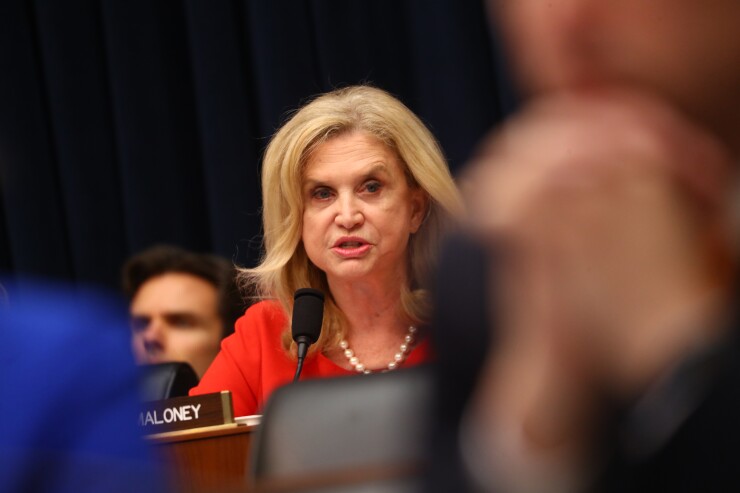WASHINGTON — Banks looking for changes to decades-old anti-money-laundering regulations cleared a significant hurdle Tuesday when the House passed legislation to require companies to disclose their beneficial owners.
The Corporate Transparency Act, sponsored by Rep. Carolyn Maloney, D-N.Y., requires companies to report their true owners to the Financial Crimes Enforcement Network when they are incorporate. The legislation passed the House 249-17, with 25 Republicans joining nearly all of the chamber’s Democrats in supporting the measure. Five Democrats opposed the bill.
The legislation would remove the burden of banks to report beneficial ownership information about their commercial clients.
“This bill would crack down on the illicit use of anonymous shell companies,” Maloney said during bill’s floor debate. “Anonymous shell companies are the vehicle of choice for money launderers, criminals and terrorists. The reason they are so popular is because they cannot be traced back to their true owners. … The reason why these companies are anonymous is because states do not require companies to name their true beneficial owners.”

In a letter to House leaders Monday, banking associations from all 50 states and Puerto Rico urged lawmakers to support the bill, saying it would “streamline the process of verifying and maintaining business ownership information captured by banks and help address this gap in the U.S. AML compliance program.”
The bill incorporates another AML reform to codify the information-sharing process between law enforcement, financial institutions and the Treasury Department. That measure, championed by Rep. Emanuel Cleaver, D-Mo., was agreed to as an amendment to Maloney’s bill. It would also require Treasury to examine whether the transaction thresholds for banks to submit suspicious activity reports and currency transaction reports should be updated.
But some GOP members have warned that the new requirements for companies to disclose their true owners to Fincen are overly burdensome to small businesses.
Republicans have also sounded the alarm on potential privacy implications. The bill creates a new database of information about companies’ beneficial owners that Republicans, including House Financial Services Committee ranking member Patrick McHenry, R-N.C., warn could be breached or misused.
“This bill would require small business owners and small business investors to submit their personal information to a new federal database without adequate privacy protections,” McHenry said during the floor debate on the bill. “This new federal database would be accessible to law enforcement without a warrant, without a subpoena, a disturbing violation of due process in my view.”
Amendments were added to the bill to strengthen privacy protections. Those included a measure to require Fincen to develop stringent procedures on who has access to the beneficial ownership information. The bill was also amended to require Treasury to report annually to Congress with statistics on the beneficial ownership information that is collected.
In a last-ditch effort to change the bill, Rep. Warren Davidson, R-Ohio, attempted to add language that would require a court-issued subpoena to accompany requests to access the information in the new Fincen beneficial ownership database. But his motion failed.
Despite the bill’s overwhelming House passage, its prospects in the Republican-controlled Senate are unclear. While eight senators, four Democrats and four Republicans, have signed on as co-sponsors of similar legislation, Banking Committee Chairman Mike Crapo, R-Idaho, has yet to schedule a vote on the bill.
But the bill got a boost from the White House, which put out a statement of administrative policy Tuesday saying the legislation “represents important progress in strengthening national security, supporting law enforcement, and clarifying regulatory requirements.”
The White House said the bill could still be improved by aligning the definition of “beneficial owner” to Fincen’s Customer Due Diligence Final Rule, protecting small businesses from disclosure burdens, and providing for adequate access controls with respect to the information gathered by Fincen.





